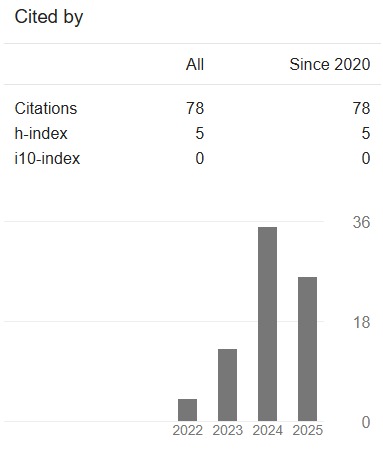Improving Automotive Accessory Development: A Warranty-Based Analysis of Material Defects and Process Enhancement
DOI:
https://doi.org/10.24191/jaeds.v5i2.112Keywords:
Warranty claims, automotive accessories, SPC, supplier collaboration, quality controlAbstract
Automotive accessories play a crucial role in enhancing vehicle safety, aesthetics, and functionality; however, they account for a significant portion of recurring warranty claims at MNC Automotive. In 2022, analysis of warranty claims data revealed that 30% of total claims were attributed to a single accessory type, indicating systemic weaknesses in design validation, supplier performance, and quality assurance. To address these challenges, this study proposed an improved accessory part development process that emphasizes early supplier collaboration, comprehensive design validation, statistical validation methods (such as SPC, Regression Analysis and Confidence Intervals), and standardized manufacturing practices. The study integrated SPC (Control Charts) and regression analysis to validate defect trends and link supplier performance with defect rates, offering quantitative validation beyond qualitative tools like Pareto charts and Ishikawa diagrams. Confidence intervals were calculated to estimate defect reduction, providing a statistical basis for the improvement strategies. Furthermore, the study included a cost-saving analysis, indicating potential RM 1.5 million savings, which was estimated through a cost-benefit analysis that simulates the ROI from improved processes. Incorporating comparative benchmarking with historical data allows us to track the severity and progress of improvements in defect rates and warranty claims. Additionally, the study integrated a more detailed evaluation of supplier performance, where supplier audits and performance ratings were used to identify critical areas for improvement in quality control. The proposed part development process aligns with APQP, PPAP, and IATF 16949 frameworks, ensuring that the model conforms to globally recognized quality management standards. Key elements of these frameworks, such as early engagement, traceability, and continuous improvement cycles, were incorporated to address recurring quality issues, thereby improving product reliability, reducing defects, and strengthening supplier relationships. This study contributes to the broader field of automotive engineering by offering a data-driven approach to improving the manufacturing and supply chain processes, with implications for reducing long-term costs, enhancing product quality, and improving customer satisfaction. By addressing key weaknesses in supplier collaboration, design validation, and quality assurance, the proposed improvements are expected to lead to significant reductions in warranty claims, ultimately benefiting both manufacturers and consumers.
Downloads
References
A. A. N. Aziana et al., "Lean Manufacturing and Industry 4.0: Unveiling Trends, Applications, and Global Impacts in Manufacturing Through Comprehensive Literature Review," Jurnal Kejuruteraan, vol. 37, no. 1, pp. 151–165, 2025.
T. Z. Gen et al., "Industry 4.0 technology adoption in Malaysian manufacturing: strategies for enhancing competitiveness," Working Paper-Asia School of Business-11/22, 2024. Available: https://asb.edu.my/wp-content/uploads/2024/05/Work-of-the-Future-Policy-Paper_1302.pdf. Accessed: Apr. 17, 2025.
DA Wahab, NFA Manan, MA Hannan, S Abdullah, and A Hussain, "Designing for comfort and reliability in an intelligent car seat," Am. J. Appl. Sci., vol. 5, no. 12, pp. 1787–1792, 2008. https://doi.org/10.3844/ajassp.2008.1787.1792.
M. Münch and D. Hampel, "Non-Recourse Problem in the Automotive Sector: Evidence from Detailed Collection of Company Data," WSEAS Trans. Bus. Econ., vol. 22, pp. 719–726, 2025.
O. Morales Matamoros et al., "Artificial intelligence for quality defects in the automotive industry: A systemic review," Sensors, vol. 25, no. 5, p. 1288, 2025.
E. E. James, A. Ocak, and S. E. Bernard, "Exploring the dynamics of product quality and failures in export trade: A systematic," 2024.
S. Fridkin, M. Winokur, and A. Gamliel, "Development of a Quality Deterioration Index for Sustainable Quality Management in High-Tech Electronics Manufacturing," Sustainability, vol. 16, no. 15, p. 6592, 2024.
L. Münch and D. Hampel, "Non-Recourse Problem in the Automotive Sector: Evidence from Detailed Collection of Company Data," WSEAS Trans. Bus. Econ., vol. 22, pp. 719–726, 2025.
E. Mitreva, "The use of quality management methods and techniques," Int. J. Econ. Manag. Tourism, vol. 5, no. 1, pp. 7–19, 2025.
O. Morales Matamoros et al., "Artificial intelligence for quality defects in the automotive industry: A systemic review," Sensors, vol. 25, no. 5, p. 1288, 2025.
S. Yahyaoui and M. Zaim, "Suppliers re-evaluation for tomorrow's smart supply chain: AHP approach and performance criteria in automotive industry," Acta Logistica (AL), vol. 12, no. 1, 2025.
O. Krupskyi, "Exploring synergy: Integrating qualitative research methods with root cause analysis for holistic problem understanding," 2024.
A. M. Titu et al., "Service process modeling in practice: A case study in an automotive repair service provider," Appl. Sci., vol. 15, no. 8, p. 4171, 2025.
F. N. Arshad and M. Haroon, "Trust the shield: Unveiling the warranty's power in building customer loyalty through complaint resolution," Rev. Econ. Dev. Stud., vol. 9, no. 2, pp. 111–131, 2023. https://doi.org/10.47067/reads.v9i2.487.
T. Peng and L. Chunling, "Designing differential service strategy for two-dimensional warranty based on warranty claim data under consumer-side modularisation," Proc. Inst. Mech. Eng. O J. Risk Reliab., vol. 234, no. 3, pp. 550–561, 2020. https://doi.org/10.1177/1748006X19886162.
A. Ferencek and M. Kljajić Borštnar, "Data quality assessment in product failure prediction models," J. Decis. Syst., vol. 29, no. sup1, pp. 79–86, 2020. https://doi.org/10.1080/12460125.2020.1776927.
D. J. Smith, Reliability, maintainability and risk: Practical methods for engineers, Butterworth-Heinemann, 2021.
S. Wu, "Warranty data analysis: A review," Qual. Reliab. Eng. Int., vol. 28, no. 8, pp. 795–805, 2012. https://doi.org/10.1002/qre.1282.
H. Qudrat-Ullah, "Structured decision-making processes," in Mastering Decision-Making in Business and Personal Life: An Interdisciplinary Perspective on Making Better Choices, Cham: Springer Nature Switzerland, 2025, pp. 147–180.
I. A. Azid, M. Z. M. Saman, S. Sharif, A. R. Ismail, and Y. Yusof, "Solving production bottleneck through time study analysis and quality tools integration," Int. J. Ind. Eng., vol. 27, no. 1, 2020. Available: https://www.researchgate.net/publication/340388707_SOLVING_PRODUCTION_BOTTLENECK_THROUGH_TIME_STUDY_ANALYSIS_AND_QUALITY_TOOLS_INTEGRATION.
A. Nikseresht, S. Shokouhyar, E. B. Tirkolaee, and E. Nikookar, "An intelligent decision support system for warranty claims forecasting: Merits of social media and quality function deployment," Technol. Forecast. Soc. Change, vol. 201, p. 123268, 2024. https://doi.org/10.1016/j.techfore.2024.123268.
G. J. Naples, By the Numbers: Principles of Automotive Parts Management, SAE International, 2024.
A. Mittal and P. Gupta, "An empirical study on enhancing product quality and customer satisfaction using quality assurance approach in an Indian manufacturing industry," Int. J. Math. Eng. Manag. Sci., vol. 6, no. 3, pp. 878, 2021.
Downloads
Published
How to Cite
Issue
Section
License
Copyright (c) 2025 Mohd Fauzi Ismail, Nor Hissham Abdul Hamid, Mahamad Hisyam Mahamad Basri, Nor Fazli Adull Manan

This work is licensed under a Creative Commons Attribution 4.0 International License.








